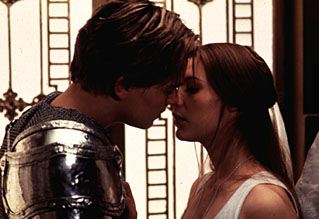A Bard Simpson
New version of 'Romeo & Juliet' turns a tin ear to Shakespeare
By Richard von Busack
I'D TEND to share the bonehead view of William Shakespeare's Romeo & Juliet--that it would have been a better movie if there'd been less talking funny. Reminding us that Shakespeare had to play to the crowd and even commenting, amusingly, that this new version is less "elitist" than previous editions, the marketing department of 20th Century Fox has done a good job of warning us that a hatchet job was in the works.
In any case, the film--which "updates" the story to a contemporary setting--is non-elitist enough to satisfy Beavis and Butt-head. It is the first Shakespeare film I can recall that has 15 stuntmen, a transvestite Mercutio and the Butthole Surfers on the soundtrack.
Drinking in the sight of Paul Sorvino in a blue sequin toga, you'd have to conclude that director Baz Luhrmann had surpassed even Ken Russell himself. The seam between the poetry of the play and the look of the film is best seen during a gargantuanly ugly costume-party sequence, during which Tybalt (John Leguizamo, quivering like an indignant turkey) complains about Romeo crashing the gate "to fleer at our solemnity." This, at a party a goat would fleer at.
The familiar tale tells of two warring families, whose scions fall for each other: the virginal Juliet (Claire Danes) of the Capulets and young Romeo (Leonardo DiCaprio) of the Montagues. Due to some too-clever plotting by a sympathetic priest, both end up dead.
Danes, of My So-Called Life, provides a Juliet so young that she looks as if she still has her milk teeth. Danes has the worst of it; note how many times the dialogue is superimposed over her as she sits, weeping and looking lovelorn. DiCaprio, himself puffy from crying, seems too stricken by despair to put up a fight against his own family, let alone his beloved's relations.
With the sole exception of Peter Postlethwaite's Father Laurence, no one has any idea of how to speak the lines. Luhrmann decided to rectify things by having the actors either shout the dialogue like drill sergeants or chat it out demotically, hoping that sheer velocity will smooth the bumps.
The production design is startling; Luhrmann's crew created a unique Verona out of a composite Mexico City and Veracruz, in which skyscrapers bear the corporate logos of Montague and Capulet. Luhrmann plays craftily on the difference between the grossness of parents and the pure, angel-like love of two adolescents, complete with a rosy suicide solution no 16-year-old could resist.
In short, William Shakespeare's Romeo & Juliet (sounds so much better than Baz Luhrmann's Romeo & Juliet, doesn't it?) is a movie made by people dead to the appeal of Shakespeare's language, yet who are capable of making an effective young-person's movie in which the moods and look are as appealing as an unusually handsome sequel to The Crow.
[ Metro | Metroactive Central | Archives ]
This page was designed and created by the Boulevards team.

My So-Called Shakespeare: Romeo (Leonardo DiCaprio) and Juliet's
(Claire Danes) first kiss.
William Shakespeare's Romeo & Juliet (PG-13; 121 min.), directed by Baz Luhrmann, written by Luhrmann and Craig Pearce, based on the play, photographed by Donald M. McAlpine and starring Leonardo DiCaprio and Claire Danes.
From the October 31-November 6, 1996 issue of Metro
![[Metroactive Movies]](/movies/gifs/movies468.gif)